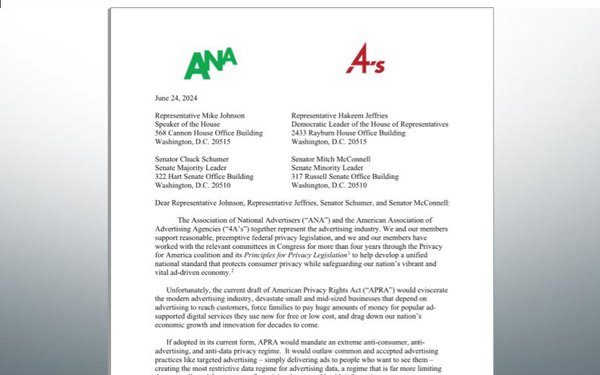
The current version of the proposed American Privacy
Rights Act “would mandate an extreme anti-consumer, anti-advertising, and anti-data privacy regime,” leaders of prominent ad organizations are telling Congress.
The measure, as
revised last week, would prohibit businesses from targeting ads to consumers based on their activity across unaffiliated sites and apps.
The proposed restriction “would eviscerate the
modern advertising industry, devastate small and mid-sized businesses that depend on advertising to reach customers, force families to pay huge amounts of money for popular ad-supported digital
services they use now for free or low cost, and drag down our nation’s economic growth and innovation for decades to come,” Association of National Advertisers CEO Bob Liodice and American
Association of Advertising Agencies CEO Marla Kaplowitz said in a letter sent Monday to House and Senate leaders.
advertisement
advertisement
The ad industry coalition Privacy for America has also weighed in against the proposed law, which was first unveiled in April,
rewritten in May, and then revamped again last week.
On Tuesday afternoon, the self-regulatory privacy group Network Advertising Initiative separately urged lawmakers to amend the measure
before advancing it, writing that the current version “contains many
provisions that would substantially and unnecessarily limit responsible data-driven advertising practices.”
The House Energy and Commerce committee is scheduled to mark up the bill on
Thursday.
The original draft, while ambiguous, was interpreted by many as banning behavioral advertising, but a version released last month would have permitted behavioral targeting on an
opt-out basis.
Liodice and Kaplowitz note those changes, writing that they “are disheartened by the arbitrary and scattershot approach.”
“The relevant language has
swung back and forth in each successive draft of the legislation with no explanation or discussion with our members -- the stakeholders most impacted by the changes -- to explain the reasoning for the
fluctuation in approach or to understand how it would impact the very entities the law seeks to regulate,” they write.
The current version would allow businesses to use their own
first-party data to retarget consumers with ads for products the consumers' previously viewed online.
Advocacy group Consumer Reports on Monday weighed in against the
current proposal -- partly because of provisions that would allow retargeting.
On Tuesday, more than 50 other watchdogs separately criticized the new version of the proposal, due in part to
the removal of a section dealing with civil rights. The two prior versions of the bill would have prohibited companies from collecting or harnessing personal data in ways that discriminate based on
race, color, religion, national origin, sex, or disability. The current iteration omits that provision.
“Privacy rights and civil rights are no longer separate concepts -- they are
inextricably bound together and must be protected,” the Leadership Conference on Civil and Human Rights, Lawyers’ Committee for Civil Rights Under Law, Electronic Privacy Information
Center and other groups said in a letter urging House Energy and Commerce
committee leaders to delay the markup.
“A privacy bill that does not include civil rights protections will not meaningfully protect us from the most serious abuses of our data,”
the groups added.